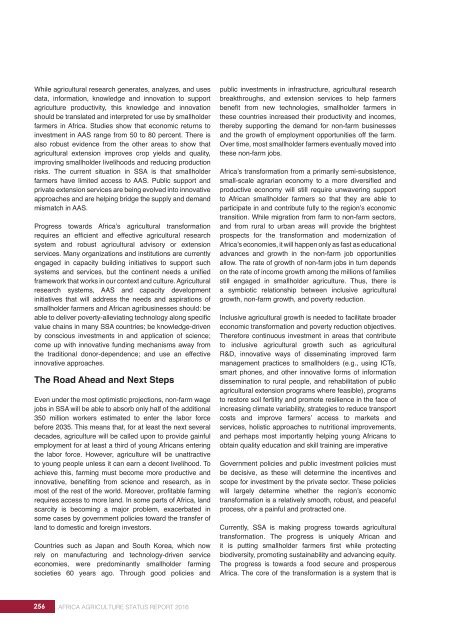AFRICA AGRICULTURE STATUS REPORT 2016
AASR-report_2016-1
AASR-report_2016-1
Create successful ePaper yourself
Turn your PDF publications into a flip-book with our unique Google optimized e-Paper software.
While agricultural research generates, analyzes, and uses<br />
data, information, knowledge and innovation to support<br />
agriculture productivity, this knowledge and innovation<br />
should be translated and interpreted for use by smallholder<br />
farmers in Africa. Studies show that economic returns to<br />
investment in AAS range from 50 to 80 percent. There is<br />
also robust evidence from the other areas to show that<br />
agricultural extension improves crop yields and quality,<br />
improving smallholder livelihoods and reducing production<br />
risks. The current situation in SSA is that smallholder<br />
farmers have limited access to AAS. Public support and<br />
private extension services are being evolved into innovative<br />
approaches and are helping bridge the supply and demand<br />
mismatch in AAS.<br />
Progress towards Africa’s agricultural transformation<br />
requires an efficient and effective agricultural research<br />
system and robust agricultural advisory or extension<br />
services. Many organizations and institutions are currently<br />
engaged in capacity building initiatives to support such<br />
systems and services, but the continent needs a unified<br />
framework that works in our context and culture. Agricultural<br />
research systems, AAS and capacity development<br />
initiatives that will address the needs and aspirations of<br />
smallholder farmers and African agribusinesses should: be<br />
able to deliver poverty-alleviating technology along specific<br />
value chains in many SSA countries; be knowledge-driven<br />
by conscious investments in and application of science;<br />
come up with innovative funding mechanisms away from<br />
the traditional donor-dependence; and use an effective<br />
innovative approaches.<br />
The Road Ahead and Next Steps<br />
Even under the most optimistic projections, non-farm wage<br />
jobs in SSA will be able to absorb only half of the additional<br />
350 million workers estimated to enter the labor force<br />
before 2035. This means that, for at least the next several<br />
decades, agriculture will be called upon to provide gainful<br />
employment for at least a third of young Africans entering<br />
the labor force. However, agriculture will be unattractive<br />
to young people unless it can earn a decent livelihood. To<br />
achieve this, farming must become more productive and<br />
innovative, benefiting from science and research, as in<br />
most of the rest of the world. Moreover, profitable farming<br />
requires access to more land. In some parts of Africa, land<br />
scarcity is becoming a major problem, exacerbated in<br />
some cases by government policies toward the transfer of<br />
land to domestic and foreign investors.<br />
Countries such as Japan and South Korea, which now<br />
rely on manufacturing and technology-driven service<br />
economies, were predominantly smallholder farming<br />
societies 60 years ago. Through good policies and<br />
public investments in infrastructure, agricultural research<br />
breakthroughs, and extension services to help farmers<br />
benefit from new technologies, smallholder farmers in<br />
these countries increased their productivity and incomes,<br />
thereby supporting the demand for non-farm businesses<br />
and the growth of employment opportunities off the farm.<br />
Over time, most smallholder farmers eventually moved into<br />
these non-farm jobs.<br />
Africa’s transformation from a primarily semi-subsistence,<br />
small-scale agrarian economy to a more diversified and<br />
productive economy will still require unwavering support<br />
to African smallholder farmers so that they are able to<br />
participate in and contribute fully to the region’s economic<br />
transition. While migration from farm to non-farm sectors,<br />
and from rural to urban areas will provide the brightest<br />
prospects for the transformation and modernization of<br />
Africa’s economies, it will happen only as fast as educational<br />
advances and growth in the non-farm job opportunities<br />
allow. The rate of growth of non-farm jobs in turn depends<br />
on the rate of income growth among the millions of families<br />
still engaged in smallholder agriculture. Thus, there is<br />
a symbiotic relationship between inclusive agricultural<br />
growth, non-farm growth, and poverty reduction.<br />
Inclusive agricultural growth is needed to facilitate broader<br />
economic transformation and poverty reduction objectives.<br />
Therefore continuous investment in areas that contribute<br />
to inclusive agricultural growth such as agricultural<br />
R&D, innovative ways of disseminating improved farm<br />
management practices to smallholders (e.g., using ICTs,<br />
smart phones, and other innovative forms of information<br />
dissemination to rural people, and rehabilitation of public<br />
agricultural extension programs where feasible), programs<br />
to restore soil fertility and promote resilience in the face of<br />
increasing climate variability, strategies to reduce transport<br />
costs and improve farmers’ access to markets and<br />
services, holistic approaches to nutritional improvements,<br />
and perhaps most importantly helping young Africans to<br />
obtain quality education and skill training are imperative<br />
Government policies and public investment policies must<br />
be decisive, as these will determine the incentives and<br />
scope for investment by the private sector. These policies<br />
will largely determine whether the region’s economic<br />
transformation is a relatively smooth, robust, and peaceful<br />
process, ohr a painful and protracted one.<br />
Currently, SSA is making progress towards agricultural<br />
transformation. The progress is uniquely African and<br />
it is putting smallholder farmers first while protecting<br />
biodiversity, promoting sustainability and advancing equity.<br />
The progress is towards a food secure and prosperous<br />
Africa. The core of the transformation is a system that is<br />
256 <strong>AFRICA</strong> <strong>AGRICULTURE</strong> <strong>STATUS</strong> <strong>REPORT</strong> <strong>2016</strong>


